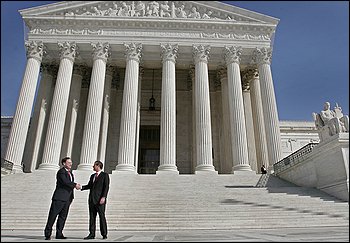Supreme Court May Overturn Campaign Finance Laws
Tomorrow, the Supreme Court is hearing a case that could overturn two recent precedents allowing the restriction of political speech by corporations for the purpose of curbing the appearance of undue influence. There’s an excellent chance they will do so.
Justice Samuel A. Alito Jr., left, and Chief Justice John G. Roberts Jr. have backed challenges to campaign finance laws. (By Lucian Perkins -- The Washington Post)
That raises ageless questions about the role of stare decisis — the court’s custom of standing by its previous decisions. But it also raises new ones about the boldness of a court that has moved to the right with the addition of Roberts and Justice Samuel A. Alito Jr. “Everyone knows this is a case about the chief and Justice Alito,” said Richard J. Lazarus, co-director of the Supreme Court Institute at the Georgetown University Law Center. “And the real question here is whether the chief is ready to pull the trigger” on declaring the restrictions unconstitutional.
Roberts’s instincts have been to move incrementally, Lazarus noted. But such a narrow and consistent chipping-away approach — Roberts and Alito have voted for every challenge to campaign finance laws since joining the court — may simply be a way to make more-sweeping decisions appear inevitable.
[…]
There are two precedents at stake in Wednesday’s rehearing of Citizens United v. Federal Election Commission. One is the court’s 1990 decision in Austin v. Michigan Chamber of Commerce, in which it upheld a state law that said corporations could be barred from spending their profits to urge a candidate’s election or defeat.
The second is part of the 2003 decision upholding Congress’s Bipartisan Campaign Reform Act, commonly known as the McCain-Feingold campaign finance law. The court ruled 5 to 4 that Congress may curtail corporate spending on advertising that mentions a candidate shortly before an election, even if it does not explicitly support or oppose that person.
Three current justices — Antonin Scalia, Anthony M. Kennedy and Clarence Thomas — have said Austin should be overturned, and all three said in McConnell v. FEC that McCain-Feingold violates the Constitution’s guarantee of free speech. Those who favor the restrictions said a recognition that government may treat corporations and individuals differently when it comes to political spending dates back more than 100 years.
I’m agnostic on the question of corporate personhood, both seeing firms as simply individuals bound together by contract and yet not necessarily entitled to every protection owed a citizen. On the specific matter of campaign finance law, however, it strikes me as obviously unconstitutional to restrict political speech.

From the article:
The pay-per-view movie was an anti-Hillary film that did not urge her defeat. So I don’t see that “precedent” as relevant.
Some of the legal commentary appears to be of the mind that the movie does not constitute an advertisement as that term is defined in McCain Feingold. In other words, there are narrow grounds available that don’t involve ruling the law unconstitutional.
But, IIRC the government’s lawyer urged a broad interpretation of the law that took a number of people aback at the first argument.
My recollection was accurate. In the first oral argument, the government’s lawyer took the position that the government could ban books by barring corporations from spending any money for their publication or distribution:
. . .
Dahlia Lithwick
Election Blog
Why don’t you find this type of coverage in the MSM? Lithwick and Richard Hasen (Election Blog) are liberals AFAIK.
They’re subject matter experts in a way that most reporters aren’t.
I would take exception on both counts. It is neither obviously nor unconstitutional. Obviously it’s fine if corporations or individuals want to make movies that take an advocacy position. But it when they want to broadcast on the public airwaves (and, I would argue that cable and satellite should and can be regulated since it is a resource that has limited access the broad population). If corporation wants to take advantage of a channel of communication that most people don’t have access to, then it can and should be regulated other wise it infringes on my right to to have my speech heard in the public square.
Amend second sentance in my the last post to read ..
It is neither obviously nor unconstitutional when it comes to corporations since only individuals can have right regardless of the massive overreach of of the corporation is a legal person status (which needs to be struck down as unconstitutional IMO)
I’ve always felt that it was more practical (enforceable) to allow any donations, but just require reporting and tracking.
I recognize that a restriction on anonymous cash donations is also a restriction on speech but … to allow a wild west would seem to be a restriction on democracy.
(I wouldn’t want any particular health care agenda funded with a black bag.)
I meant that I would hope/expect reporters of the court to be familiar with the commentary that’s out there about the government’s lawyer’s controversial statements in the first oral argument.
A few months ago, Justice Scalia made asked a question about strip-searching students that got a lot of headlines, even though he was merely probing the position of the lawyers. Here, the government’s position was potentially quite extreme and disturbing across the ideological divides.
No mention of it, just another story inaccurately framed as fire-breathing reactionary justices undermining decades of legal precedent.
@JJ
I am too, but not in the way I am about the three persons of the Trinity.